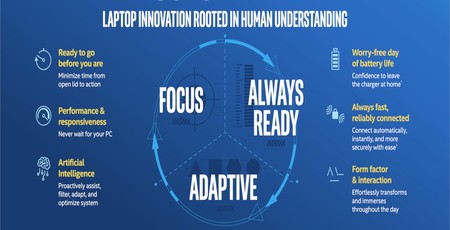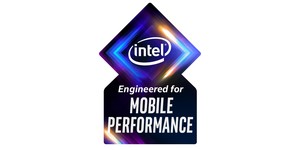
Intel has used the Consumer Electronics Show 2019 (CES 2019) to unveil a new mobility-centred initiative in the style of its classic Centrino effort: Project Athena, 'developed to help usher in a new class of advanced laptops.'
As well as promising 10nm parts in volume by the end of the year and refreshing its ninth-generation 14nm Core-brand desktop family, Intel has used the platform of the Consumer Electronics Show to announce Project Athena. Described by the company as an 'industry-wide laptop innovation programme', Project Athena is claimed to 'help bring to market a new class of advanced laptops' - laptops which, naturally, are powered exclusively by Intel processors.
Drawing on the company's classic Centrino and Ultrabook initiatives, the first mainstream computing platform with integrated Wi-Fi connectivity and a standard for ultra-slim laptops respectively, Project Athena has five key pillars. The first pillar is the promise of annual specification updates, outlining exactly what needs to go into a system for it to be considered a Project Athena device. At the same time, the specifications will include user experience and benchmarking targets, based - so Intel claims - on real-world usage models.
Those signing up to Project Athena, meanwhile, will receive 'extensive co-engineering support and innovation pathfinding' alongside ecosystem collaboration which will see Intel assist with the development and availability of key laptop components. Finally, devices that have gone through the Project Athena programme will receive a certification to proclaim their suitability.
'Based on extensive research to understand how people use their devices and the challenges they face,' claims Intel of the initiative, 'the annual spec combines key areas of innovation to deliver laptops that are purpose-built to help people focus, adapt to life’s roles and always be ready.' This includes, but is not limited to, requirements for a maximum time from lid-open to action, minimum performance and responsiveness, full-day battery life, 'always-ready' wireless connectivity, and integration of artificially intelligent capabilities to 'proactively assist, filter, adapt, and optimise [the] system.'
While only publicly unveiled late last night, Intel has already signed up some of the biggest original equipment and original design manufacturers (OEMs and ODMs) to the programme: Acer, Asus, BOE, Compal, Dell, EDO, Google, HP, Huawei, Huaqin, Innolux, Lenovo, Microsoft, Pegatron, Quanta Computer, Samsung, Sharp, Wistron, and Xiaomi's Mi arm. Launch dates for the first Project Athena devices, however, have not yet been revealed.

MSI MPG Velox 100R Chassis Review
October 14 2021 | 15:04








Want to comment? Please log in.